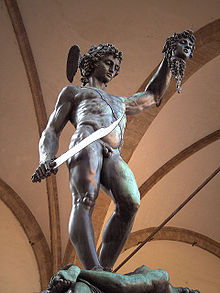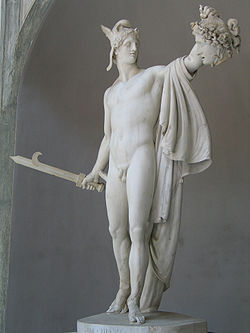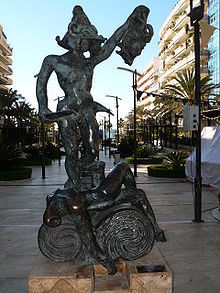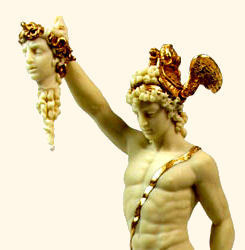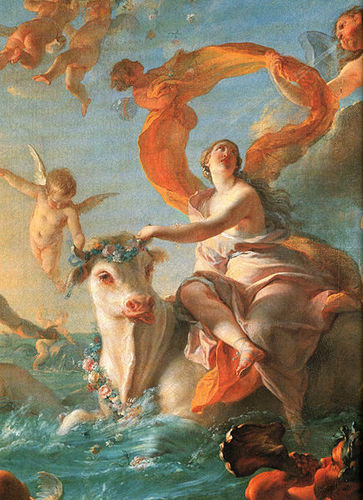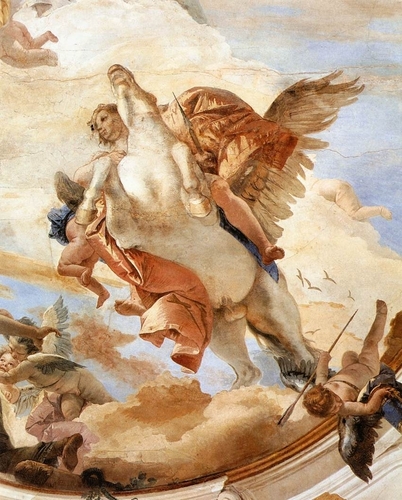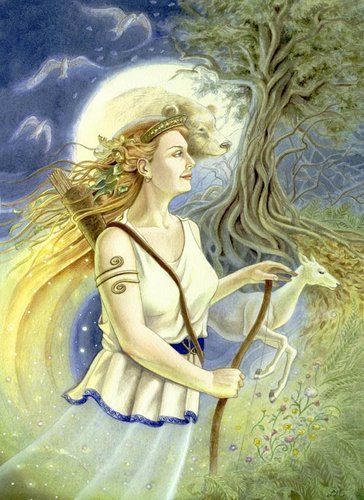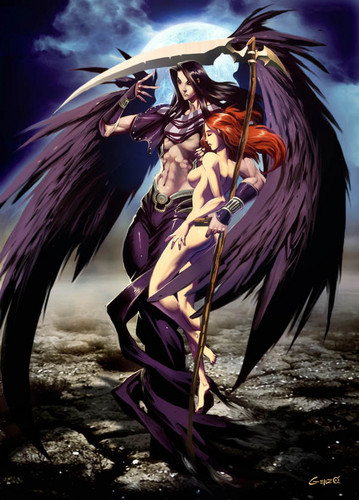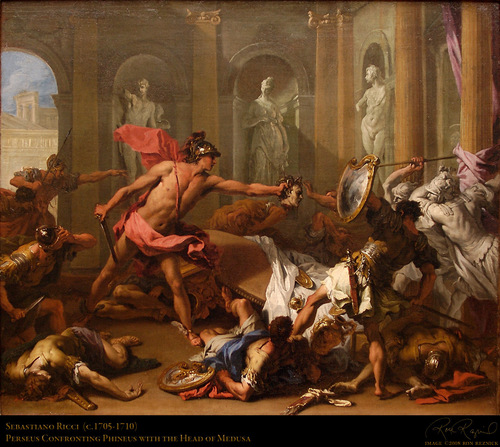Perseus (Περσεύς),[note 1] the legendary founder of Mycenae and of the Perseid dynasty there, was the first of the mythic heroes of Greek mythology whose exploits in defeating various archaic monsters provided the founding myths of the Twelve Olympians. Perseus was the Greek hero who killed Medusa and claimed Andromeda, having rescued her from a sea monster.
Marriage with Andromeda
Perseus rescuing Andromeda from Cetus, depicted on an amphora in the Altes Museum, Berlin
Perseus and Andromeda.
On the way back to Seriphos Island, Perseus stopped in the Phoenician kingdom Ethiopia, ruled by King Cepheus and Queen Cassiopeia. Cassiopeia, having boasted herself equal in beauty to the Nereids, drew down the vengeance of Poseidon, who sent an inundation on the land and a sea serpeant, Cetus, which destroyed man and beast. The oracle of Ammon announced that no relief would be found until the king exposed his daughter Andromeda to the monster, and so she was fastened to a rock on the shore. Perseus slew the monster and, setting her free, claimed her in marriage.
In the classical myth, he flew using the flying sandals. Renaissance Europe and modern imagery has generated the idea that Perseus flew mounted on Pegasus (though not in the great paintings by Piero di Cosimo and Titian)[note 5].
Perseus married Andromeda in spite of Phineus, to whom she had before been promised. At the wedding a quarrel took place between the rivals, and Phineus was turned to stone by the sight of the Gorgon's head.[12] Andromeda ("queen of men") followed her husband to Tiryns in Argos, and became the ancestress of the family of the Perseidae who ruled at Tiryns through her son with Perseus, Perses.[13] After her death she was placed by Athena amongst the constellations in the northern sky, near Perseus and Cassiopeia.Sophocles and Euripides (and in more modern times Pierre Corneille) made the episode of Perseus and Andromeda the subject of tragedies, and its incidents were represented in many ancient works of art.
Perseus and the head of Medusa in a Roman fresco at Stabiae
As Perseus was flying in his return above the sands of Libya, according to Apollonius of Rhodes,[14] the falling drops of Medusa's blood created a race of toxic serpents, one of whom was to kill the Argonaut Mopsus. On returning to Seriphos and discovering that his mother had to take refuge from the violent advances of Polydectes, Perseus killed him with Medusa's head, and made his brother Dictys, consort of Danaë, king.
Perseus and Andromeda had seven sons: Perses, Alcaeus ("strong"), Heleus ("nailer"), Mestor ("the cunning one"), Sthenelus ("the mighty one"), Electryon ("amber"), and Cynurus ("dogtail"), and two daughters, Gorgophone ("Gorgon Killer") and Autochthoe ("[Born] of the Land"). Perses was left in Aethiopia and became an ancestor of the emperors of Persia. The other descendants ruled Mycenae from Electryon down to Eurystheus, after whom Atreus got the kingdom. However, the Perseids included the great hero, Heracles, stepson of Amphitryon, son of Alcaeus. The Heraclides, or descendants of Heracles, successfully contested the rule of the Atreids.
A statement by the Athenian orator, Isocrates[21] helps to date Perseus roughly. He said that Heracles was four generations later than Perseus, which corresponds to the legendary succession: Perseus, Electryon, Alcmena, and Heracles, who was a contemporary of Eurystheus. Atreus was one generation later, a total of five generations.
Marriage with Andromeda
Perseus rescuing Andromeda from Cetus, depicted on an amphora in the Altes Museum, Berlin
Perseus and Andromeda.
On the way back to Seriphos Island, Perseus stopped in the Phoenician kingdom Ethiopia, ruled by King Cepheus and Queen Cassiopeia. Cassiopeia, having boasted herself equal in beauty to the Nereids, drew down the vengeance of Poseidon, who sent an inundation on the land and a sea serpeant, Cetus, which destroyed man and beast. The oracle of Ammon announced that no relief would be found until the king exposed his daughter Andromeda to the monster, and so she was fastened to a rock on the shore. Perseus slew the monster and, setting her free, claimed her in marriage.
In the classical myth, he flew using the flying sandals. Renaissance Europe and modern imagery has generated the idea that Perseus flew mounted on Pegasus (though not in the great paintings by Piero di Cosimo and Titian)[note 5].
Perseus married Andromeda in spite of Phineus, to whom she had before been promised. At the wedding a quarrel took place between the rivals, and Phineus was turned to stone by the sight of the Gorgon's head.[12] Andromeda ("queen of men") followed her husband to Tiryns in Argos, and became the ancestress of the family of the Perseidae who ruled at Tiryns through her son with Perseus, Perses.[13] After her death she was placed by Athena amongst the constellations in the northern sky, near Perseus and Cassiopeia.Sophocles and Euripides (and in more modern times Pierre Corneille) made the episode of Perseus and Andromeda the subject of tragedies, and its incidents were represented in many ancient works of art.
Perseus and the head of Medusa in a Roman fresco at Stabiae
As Perseus was flying in his return above the sands of Libya, according to Apollonius of Rhodes,[14] the falling drops of Medusa's blood created a race of toxic serpents, one of whom was to kill the Argonaut Mopsus. On returning to Seriphos and discovering that his mother had to take refuge from the violent advances of Polydectes, Perseus killed him with Medusa's head, and made his brother Dictys, consort of Danaë, king.
Perseus and Andromeda had seven sons: Perses, Alcaeus ("strong"), Heleus ("nailer"), Mestor ("the cunning one"), Sthenelus ("the mighty one"), Electryon ("amber"), and Cynurus ("dogtail"), and two daughters, Gorgophone ("Gorgon Killer") and Autochthoe ("[Born] of the Land"). Perses was left in Aethiopia and became an ancestor of the emperors of Persia. The other descendants ruled Mycenae from Electryon down to Eurystheus, after whom Atreus got the kingdom. However, the Perseids included the great hero, Heracles, stepson of Amphitryon, son of Alcaeus. The Heraclides, or descendants of Heracles, successfully contested the rule of the Atreids.
A statement by the Athenian orator, Isocrates[21] helps to date Perseus roughly. He said that Heracles was four generations later than Perseus, which corresponds to the legendary succession: Perseus, Electryon, Alcmena, and Heracles, who was a contemporary of Eurystheus. Atreus was one generation later, a total of five generations.
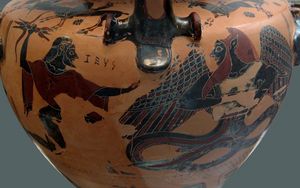
Zeus darting its lightning on Typhon. Side B from a Chalcidian black-figured hydria, ca. 550 BC.

The Return of Persephone by Frederic Leighton (1891)


